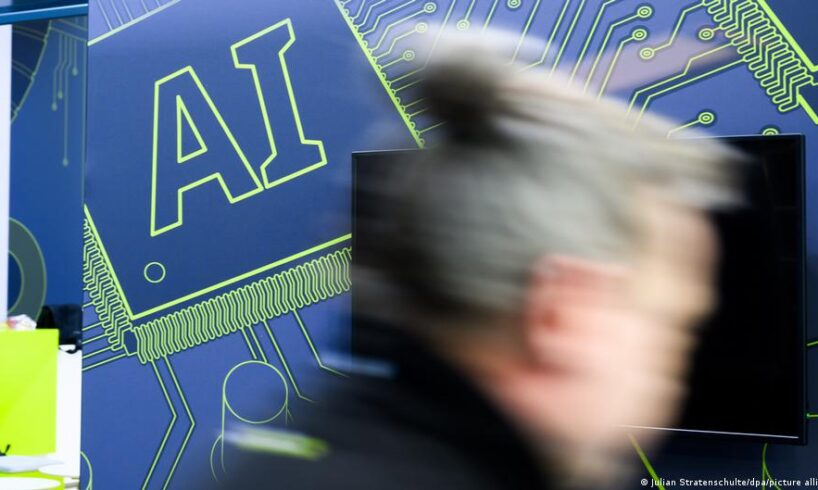
Germany has been warned for years that it risks becoming an “industrial museum” unless it embraces radical modernization — and that includes artificial intelligence (AI).
Productivity in Europe’s biggest economy has barely grown for 15 years, export share in automobiles and machinery is shrinking and Germany’s energy costs are among the highest in the G7 group of wealthy nations. Together, this has created a toxic mix that is steadily eroding the country’s global competitiveness.
Policymakers and business leaders believe a narrow window exists to reverse the slide by fully embracing AI in factories and supply chains, helping the country to play catch-up with the world’s two biggest players, the United States and China.
Speaking at the inauguration of Europe’s first exascale supercomputer, Jupiter, in September, German Chancellor Friedrich Merz noted that the two global powers are in a “neck‑and‑neck race to compete for future market share in an AI‑supported global economy.”
“We in Germany and we in Europe have every opportunity to catch up and then keep pace,” he told attendees of the launch ceremony in the town of Juelich in western Germany.
The US and China have pushed ahead with AI models such as ChatGPT and DeepSeek, advanced chips and industrial-scale stress tests of data centers. Their early tests prove their systems can handle AI workloads at business-critical scale without downtime.
Germany’s ‘Jupiter’ supercomputer a European accomplishment
To view this video please enable JavaScript, and consider upgrading to a web browser that supports HTML5 video
Never-ending AI pilot projects
Germany’s industrial giants, meanwhile, have been accused of being trapped in so-called pilot purgatory, experimenting with AI but hesitant to fully roll out ambitious projects.
Bosch, for instance, launched generative AI pilots in its factories in late 2023 to optimize production scheduling and monitoring. Volkswagen, in collaboration with Siemens, has tested AI‑driven digital-twin factories — virtual replicas of production lines that allow engineers to simulate, predict and improve performance.
While these projects have been praised as innovative, until recently, they were still confined to limited trials rather than full or partial rollout, often due to legal and safety concerns.
“Many [German] firms still lack clear AI strategies and change-management capacity,” AI expert and author Thomas Ramge told DW. “So pilots don’t scale into core operations.”
Once the Germany’s industrial leaders can prove AI’s economic benefits, Ramge added, the country’s deep manufacturing know‑how and network of small and medium‑sized suppliers that feed into major supply chains will help German firms to play catch‑up.
Dresden startup Wandelbots develops software that lets firms program industrial robotsImage: Sylvio Dittrich/imageBROKER/picture alliance
Germany’s Economy Ministry forecasts that AI could deliver at least one extra percentage point of annual real GDP growth from 2026 onward.
Germany hampered by talent, chip shortages
As well as competing globally for the best tech talent and the high-end chips needed to power AI, German firms remain risk-averse amid high up-front costs and a corporate culture that still prizes caution over disruption.
They must also grapple with regulatory uncertainty, especially with regard to the European Union’s AI Act, which critics say is overly complex, vague in its definitions and has strict compliance rules on applications deemed high-risk. The European Commission has proposed delaying the act’s full rollout until August 2027.
Despite the many hurdles, Germany’s AI adoption is accelerating rapidly. According to a survey published in May by the ifo Institute in Munich, 41% of companies now use AI in their business processes — a 27% jump from the previous year. Nearly one in five firms plan to adopt it soon.
Germany’s industrial leaders are clearly setting the pace, with more than half already deploying AI. Yet the survey also highlights lingering concerns. Many smaller firms and sectors — including retail, hospitality and construction — remain hesitant, with some saying AI is not even on their agenda.
Beyond uneven adoption, the survey reveals a looming labor market challenge. More than a quarter of German firms expect AI to result in cut jobs over the next five years, while only a small minority foresee new positions opening up.
Alexandre Mendonca, an affiliate fellow at the Brussels-based think tank Bruegel, thinks this is ironic due to labor shortages sparked by the global AI boom.
“German firms are having a hard time finding specialists to work with this type of technology — it’s actually one of the highest rates in the EU,” Mendonca told DW. “Adoption is not enough — capacity to use AI is crucial.”
Digitalization and AI: Jobs on the brink?
To view this video please enable JavaScript, and consider upgrading to a web browser that supports HTML5 video
Germany’s growing AI successes
Germany may be cautious in fully rolling out industrial-grade AI, but one of its business giants is already shaping the global infrastructure behind the current AI boom.
Siemens is a key part of Europe’s “Data Center Four” — also made up of France’s Legrand, Schneider Electric and ABB from Switzerland — which provide the automation systems, power grids, and cooling technologies that keep hyperscale AI facilities running reliably. These are the only four European firms that can match Silicon Valley for size.
Germany’s automotive sector is also rolling out AI at scale, with more than 70% of carmakers and parts suppliers already using it in production, according to the ifo survey.
Yet, as Ramge cautions, these deployments are critical but may not be enough to tackle the many headwinds facing the auto industry, including volatile electric-vehicle (EV) demand, soaring energy costs and fierce competition from China.
“AI will be a necessary condition for [auto industry] survival — through software-defined vehicles, smarter production and better supply-chain management — but it won’t be sufficient on its own,” Ramge told DW. “Strategy, cost structures and industrial policy all have to move in parallel with AI deployment.”
German automakers are rolling out AI across production lines and vehicle softwareImage: JENS SCHLUETER/AFP/Getty Images
Germany has also chalked up AI successes beyond industry. SAP has embedded generative AI into its enterprise software, which is used worldwide, via a co-pilot named Joule, while insurance company Allianz is deploying AI for risk modeling and fraud detection globally.
The faster German companies adopt AI, the bigger the gains are expected to be, helping to fix some of the country’s biggest issues.
A 2023 report by business consultancy McKinsey predicted that annual productivity growth could be lifted by up to 1.5% over the next decade, while annual GDP could rise by up to €450 billion ($520 billion) and German factories could use up a quarter less electricity.
While Germany is ahead of much of the rest of the EU in AI adoption, Bruegel’s Mendonca thinks the country’s progress will continue to be constrained by ongoing talent shortages and a dash to train new workers amid rapidly evolving technology.
“Germany’s tech and scientific sectors are at the forefront of AI adoption. These same sectors are also experiencing a shortage of talent,” he said. “That talent does not exist now — so we have to think ahead.”
Edited by: Uwe Hessler





